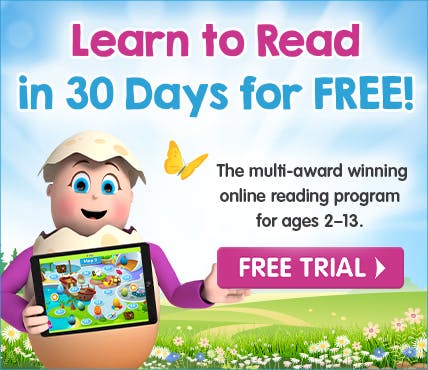


5 Fun Activities for Language Development

There are many simple and fun activities parents can do to develop essential speech and language skills.
Parents play a big role in encouraging their child's language development. Most children learn basic listening, speaking, reading and writing skills from birth through to Year 3.
Studies show that children who are read to and spoken with regularly during early childhood will have a wider vocabulary and stronger literacy skills overall than those who aren't. Additionally, there are many fun and simple activities that parents can do with their child to develop and support essential speech and language skills.
Build early language skills with ABC Reading Eggs!
ABC Reading Eggs Junior features fun and interactive activities, videos, songs and picture books that promote early language development and pre‑reading skills in young children.
1. Storytelling
Storytelling is a great family activity that encourages language development and introduces new vocabulary. Make up stories together with your child including characters, conflict and a happy ending. Sit down to look at family photographs, talking about who is in the photograph, what they were doing and where they were. Ask your child to retell stories and set aside time for regular reading. You can even narrate the day with your child as it unfolds, e.g. “Now we're going outside to water the flowers. When we finish, we'll prepare the table for lunch.”
2. Labelling game
Cut pieces of cardboard paper and write the words for common items found around the house. These can include things like furniture, bathroom items, articles of clothing and children's toys. Read each word aloud and ask your child to place it on top of the correct item. Gradually you can begin writing words for adjectives to describe household items. Include new adjectives that your child may not know and help them find items that can be described using that word. Encourage them to say each word aloud and even think of some of their own adjectives.
3. Picture book spotters
Read picture books with your child and pause to look at and discuss the pictures. Repeat what you have read in the story by pointing out to what is happening in the pictures. Encourage your child to make comments by asking them what else they can spot, e.g. “Big Ted is wearing his red shirt! What else is he wearing on his feet?” “The princess is sitting in the garden. What else can we see in the garden?”
4. Word chain
Building on the words and language your child already uses is an easy way to strengthen their language skills. Cut pieces of cardboard paper and write the words for different nouns and verbs your child is familiar with. Then write the words for different adjectives and adverbs. Help your child to make a 'word chain' using one noun or verb and as many adjectives and adverbs as possible. For example, if the word is 'car', you may select words like 'big', 'fast', 'red', 'shiny' or 'noisy' to create a word chain. Building language can also be incorporated into everyday situations. For example, if your child says the word 'cat', you can say, 'soft cat' or 'sleepy cat'.
5. Role-playing
Role-playing is a fun and powerful way to expand your child's imagination and introduce related language and words. Using costumes and props (or imaginary ones!), you can role‑play scenarios which involve different characters to introduce related words and stretch your child's imaginative play skills. For example, if you pretend to be a teacher, include as many related words as possible, e.g. classroom, students, blackboard, desk, books, learning, reading etc.


